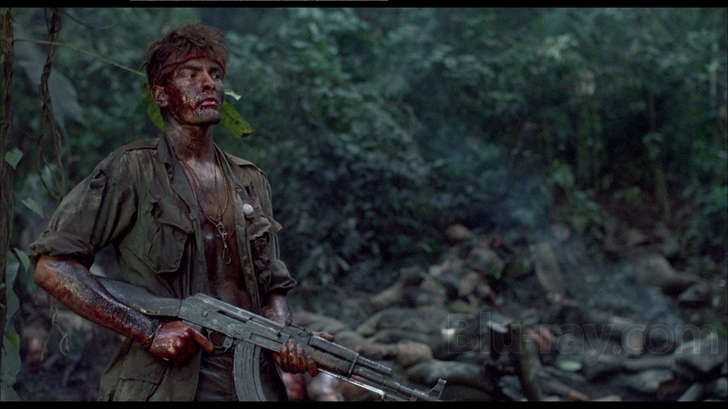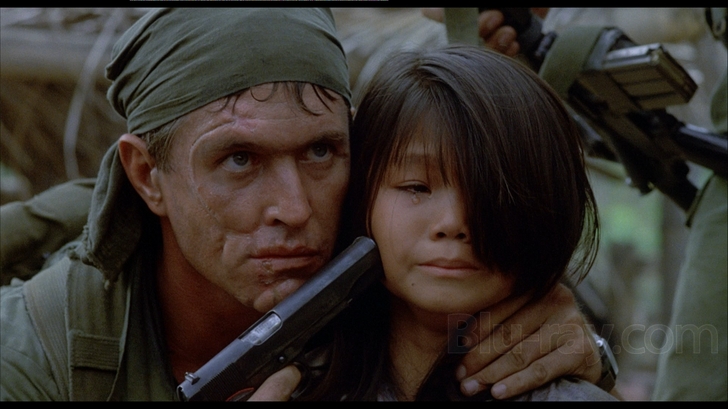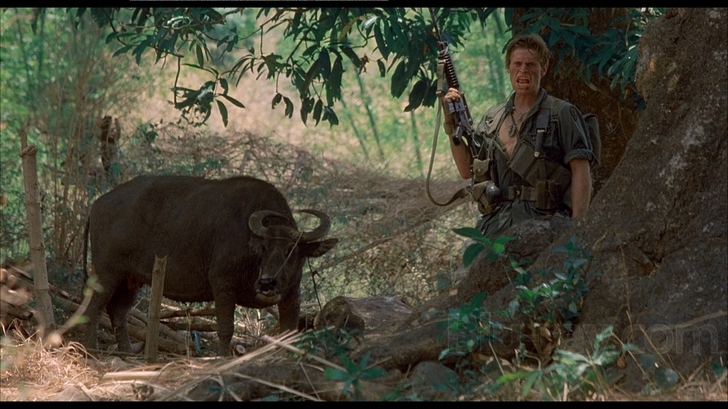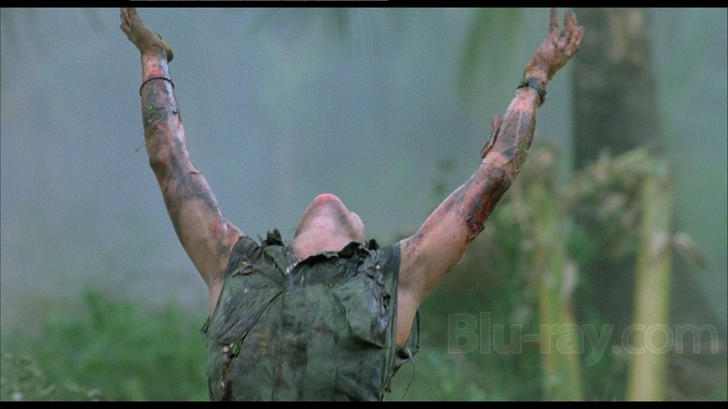Platoon Blu-ray Movie
HomePlatoon Blu-ray Movie 
25th Anniversary Edition / Blu-ray + DVDMetro-Goldwyn-Mayer | 1986 | 120 min | Rated R | May 24, 2011
Movie rating
8.1 | / 10 |
Blu-ray rating
| Users | 3.7 | |
| Reviewer | 4.0 | |
| Overall | 3.8 |
Overview
Platoon (1986)
A young soldier must choose between his two platoon leaders and confront the horrors of war and the duality of man.
Starring: Tom Berenger, Willem Dafoe, Charlie Sheen, Forest Whitaker, Francesco QuinnDirector: Oliver Stone
| Drama | Uncertain |
| War | Uncertain |
| Melodrama | Uncertain |
| Action | Uncertain |
Specifications
Video
Video codec: MPEG-4 AVC
Video resolution: 1080p
Aspect ratio: 1.85:1
Original aspect ratio: 1.85:1
Audio
English: DTS-HD Master Audio 5.1 (48kHz, 16-bit)
English: Dolby Digital 4.0 (Original)
Spanish: Dolby Digital 5.1
French: DTS 5.1
Portuguese: Dolby Digital 5.1
German: DTS 5.1
Italian: DTS 5.1
Russian: DTS 5.1
Spanish: DTS 5.1
Czech: Dolby Digital 2.0
Hungarian: Dolby Digital 2.0
Subtitles
English SDH, French, German, Italian, Portuguese, Spanish, Cantonese, Czech, Danish, Dutch, Finnish, Greek, Hungarian, Korean, Mandarin (Traditional), Norwegian, Polish, Russian, Swedish, Thai, Turkish
Discs
50GB Blu-ray Disc
Two-disc set (1 BD, 1 DVD)
DVD copy
Packaging
Slipcover in original pressing
Playback
Region free
Review
Rating summary
| Movie | 5.0 | |
| Video | 4.0 | |
| Audio | 3.0 | |
| Extras | 4.5 | |
| Overall | 4.0 |
Platoon Blu-ray Movie Review
Oliver Stone's magnum opus finally makes its long-awaited Blu-ray debut.
Reviewed by Martin Liebman May 25, 2011Those of us who did make it have an obligation to build again, to teach to others what we know, and to try with what's left of our lives to find a
goodness and meaning in this life.
Thus is the summation of Platoon, a picture of great craftsmanship yes but a far more important film in terms of its messages not as they
necessarily oppose the act of war but instead identify and accentuate the goodness that must come from it, lest man once again fall into the pit of
despair, having failed to learn his lessons from past actions only to once again defile himself in the senseless bloodshed and again come to reflect
on
both its follies and how it may in the future be avoided for the first and, perhaps, only time. War is a vicious cycle that's proven an unavoidable
truth of life since time began, and for every man who falls, another inevitably concludes that from the ashes must rise a new life, a new purpose, a
new means of looking at the world and finding whatever it may be that will rebuild society not in the image of what it was, but what it must
become. History has taught that worldly divisions, however, are far too great to be conquered by idealism and dialogue alone, man eventually
succumbing to the clashing of swords in hopes that a dominant force of will may artificially progress an opponent towards those fundamental ideals
which alter from man to man, from land to land. War has never absolutely succeed in its purpose -- and it does serve a purpose -- of positively
brining about harmony through the domination of evil; war is instead an ever-evolving beast, something that continues to fester and bring
consequences to the world even when the guns have silenced and the deaths have ceased. What follows are those very same grand ideals -- that
necessary and honest notion that "those of us who did make it have an obligation to build again, to teach to others what we know, and to try with
what's left of our lives to find a goodness and meaning in this life" -- that come from war but are never the result of war, far too often existing only
as words but not actions. War is hell, indeed, and
Director Oliver Stone's Platoon unflinchingly journeys there in hopes that by somehow artificially recreating it it may never again be made.

Chris wrestles with the demons of war that want to destroy his soul.
Chris Taylor (Charlie Sheen, Wall Street) is a fresh-from-college Army volunteer who's as green as his fatigues and the Vietnamese jungle, a boy who's completely unprepared for the experiences that are about to redefine his life. In the 'Nam, the men count their days remaining "in-country," hoping and praying to survie another day of their mandatory year of service. One year, one long, bloody year is all it takes to jeopardize a life both on the field of battle and within one's own being. Taylor finds himself in the midst of a growing rift within his platoon; as the death toll mounts from nighttime ambushes and booby-traps, the men begin to emotionally fall to pieces and feed off their negativity, which comes to a head when the platoon exacts revenge on a village suspected to be a Viet Cong stronghold. Tensions erupt into a fistfight between Staff Sergeant Barnes (Tom Berenger, Major League) and Sergeant Elias (Willem Dafoe, Flight of the Intruder), the latter of whom admonishes Barnes's overtly aggressive and violent behavior towards the villagers. Chris, himself emotionally distraught, experiences both extremes in mere moments, at first torturing a Vietnamese civilian and, seeing the error of his ways, breaking up a gang rape on a young villager. With the men now clearly divided, it's only a question as to whether the enemy or the schism between the men will be the platoon's undoing.
Platoon represents the very essence of purposefully haunting cinema; Oliver Stone's (World Trade Center) film is one of a great juxtaposition, on one hand representing admirable cinematic craftsmanship and storytelling prowess the likes of which only select films achieve, and on the other a film that is sometimes impossible to watch for its frighteningly intense and emotionally draining account of the Vietnam War as it is waged both on the battlefields and within the very souls of men. Platoon is not a movie made with entertainment in mind; certainly it may be seen as such by more naive audiences who may lack the life experiences to truly appreciate the purpose behind Stone's work (read: many children and young adults), but most mature viewers will find in the film a transformative, or at the very least enlightening, narrative that desperately searches for what shred of good there may be in war, amidst what is not only chaos of the physical sort but the destruction of the very essence of man. In Platoon, Stone analyzes three critical elements: the destruction of the physical body, the corruption of the mind, and the disappearance of the soul (or humanity), all a result of the cumulative effects of war. So often it is only the first that is emphasized by those who criticize war, but it is truly those greater losses that occur on the emotional and metaphysical levels that leave the scars that truly never heal. Indeed, as the tagline for Platoon reads, "the first casualty of war is innocence." That is the essence of the film, but from the destruction of innocence and the necessary maturation that comes from it must yield that desire to "to build again, to teach to others what we know, and to try with what's left of our lives to find a goodness and meaning in this life."
Platoon also serves as a microcosm for the division of men and the resultant war as evidenced by the primary plot, which is the schism that grows between the men in the platoon; though the men may have a common enemy against whom most of the physical action takes place, it's the battle for their minds, hearts, souls, and allegiances that truly shape the film. In Platoon, the men divide into two opposing factions where the social structure of war is not defined by those elements that tend divide outside the battlefield -- race, religion, politics, and the like -- but they instead divide along what may appear to be more arbitrary lines, lines that are at first blurred but come into focus as morality is pushed aside, yielding the resultant corruption of the mind and soul through the process of war. The battle-scared Barnes leads the camp that has become desensitized from humanity. Not all of his followers have yet to fully descend into the absolute madness of their leader, but they have allowed the physical casualties of war to at least begin the process of destroying their humanity as they tumble down the slippery slope into Barnes's hell. On the other side is Elias, a man who has survived several tours not only in the physical sense, but in the emotional and spiritual realm as well. He still holds morality in the highest regard, and the dangers and deaths that have come to define his environment have yet to corrupt him as they have Barnes. Taylor finds himself caught in a figurative tug-of-war between the men as they battle for possession of his soul, as he states. Taylor's emotional imbalance comes to a head in the village when his emotions overwhelm him and negativity embraces him; he's on the precipice of self-destruction as he taunts a young one-legged, facially-deformed man, but his cathartic moment comes when the gung-ho, war-crazed, humanity-abandoned Bunny (Kevin Dillon) slaughters the man in cold blood. Taylor, in that moment, immediately entrenches himself firmly in the Elias camp, but more importantly, he rescues his soul from the brink of personal devastation. This is the most critical scene in Platoon; it encapsulates the true battle for the heart and soul of every combatant and while it may have been an isolated, inconsequential event in the greater scheme of the war-at-large, it forever defines Taylor as a man and ensures that, live or die in the physical, his humanity will remain.
Platoon's emotional resonance and significance is greatly accentuated, but not defined, by Oliver Stone's craftsmanship and the work of his cast and crew. Stone, himself a veteran of Vietnam, gives his picture an uncanny sense of authenticity that's not manifested necessarily in the action scenes or costumes, but in the way he directs his men to act, the way he so effortlessly re-creates both the physical and metaphorical battlefields that shaped the war and the men who fought in it. He expertly constructs his characters and the film-at-large to build to a crescendo of emotional unrest, thematic power, and physical challenge, all of which further enhance the picture's primary reason for being. The cast is equally superb. Charlie Sheen's portrayal of Chris is a great strength; he defines the picture's themes through the voiceover reading of letters to his grandmother that demonstrate his progression through the film, beginning by claiming that he "made a big mistake coming here" and ultimately evolving to where he finds in his experiences the positive outlook which challenges himself and those fellow survivors to find meaning in their experiences and to rebuild their world in such a way that may avoid the physical, emotional, and spiritual calamities of war in the future. Sheen handles the physical challenges of the role very well, too, transitioning from a green and confused inexperienced solider to a man with a thousand years worth of experiences accrued in mere months. Tom Berenger and Willem Dafoe dazzle as the opposing de facto "father figures" in the film, each representing two extremes as their experiences in the war shape who they have become, Berenger the grizzled, hard, soulless soldier and Dafoe the man who has defied the odds and maintained an internal balance despite his lengthy participation in war. The film is also packed with an amazing array of talent; there's nary a character who isn't played by a name actor, including Forest Whitaker, Keith David, John C. McGinley, Francesco Quinn, Kevin Dillon, and Johnny Depp. The picture is accentuated by a beautiful rendition of Adagio for Strings, a wonderfully melancholic, in a way almost angelic, piece, that hangs over the picture and resonates powerfully as an audible theme for the challenges of war and the need to retain morality, even if it comes at the expense of innocence.
Platoon Blu-ray Movie, Video Quality 

Platoon's long-awaited 1080p Blu-ray debut transfer will satisfy most fans, but leave many more wondering if it could have been a little bit better. The image retains some grain -- a bit here, a noisy spike there -- but at other times it appears a little too clean, perhaps suggesting a touch of noise reduction in some scenes. The print is in fair shape, exhibiting a few minor and random pops and scratches but otherwise appearing stable and accurate throughout. Fine detail is decent; facial textures often look good but not amazingly intricate, but the 1080p transfer does pick up a few little surprises that longtime Platoon viewers with well-worn VHS and LaserDisc editions will note for the first time, whether additional face paint, grime, bug bite makeup, or other mostly inconsequential textures that never really stood out on lower-resolution releases. The image also benefits from a boost in clarity and stability, which also accentuates finer details in uniforms and foliage. Additionally, detail increases in brighter scenes when the image isn't trapped in nighttime shots or under the relative darkness of the jungle canopy. Colors are pretty much limited to shades of green in many scenes, with the camouflaged uniforms blending in with the surrounding jungle but with just enough differentiation in shading to allow viewers to clearly make out what's going on in most scenes. Brighter colors are limited to a dash of red in a pack of Marlboros or a red bandana Taylor wears at the end of the film. Black levels could stand to improve a bit; slight crush is evident at times, but at the same time blacks never wash out or brighten up, instead remaining inky dark, a critical component in accentuating the dangers and nighttime environments. Chances are most Platoon fans will be pleased with MGM's transfer given the right expectations. It would be nice to think that this could look like some brand new release, but the reality is that a sometimes wishy-washy transfer that settles on the positive side of "good" -- which this one most certainly is -- is probably about the best one could hope for.
Platoon Blu-ray Movie, Audio Quality 

Unfortunately, Platoon's DTS-HD MA 5.1 lossless soundtrack is the unequivocal weak point in this release. Much like the video presentation, it's simply unrealistic to expect Platoon to suddenly sound like Saving Private Ryan just because it's on Blu-ray and plays through a lossless soundtrack. The results are decidedly mixed, with part of the perceived problems appearing to be inherent to the source, and a few other problems perhaps the result of an engineering misstep on the transfer-to-Blu-ray process. The track seems inherently shallow and limited in range; music always plays with a subtly cramped feel to it. Clarity is fair, but whether the opening Adagio for Strings selection or The Tracks of My Tears by Smokey Robinson & The Miracles, music always seems a little bit less-than-ideal, struggling to stretch naturally across the soundstage or even play at an expectedly higher volume. Nevertheless, various sound effects maneuver around the soundstage effortlessly enough, whether a chopper traversing from side to side, a jet screeching through the sky, or weapons fire tearing through the listening area. None of these enjoy pinpoint clarity, but the raw sound effects are nicely handled by the 5.1 soundtrack. Jungle and general atmospherics are nicely and tastefully implemented; whether singing birds or always-buzzing insects, Vietnam's jungles spring to life in most scenes. On the flip side, a few scenes featuring heavy falling rains sound clumpy and indistinct, while weapons fire is usually mushy and lacking in power, particularly evidenced in the scene where Chris fires at the foot of the crippled villager; the shots sound more like they're coming from a cap gun rather than a full-powered rifle. The most disappointing aspect of the track comes in dialogue reproduction; while most of the film features balanced and clear speech, far too many lines sound unbalanced, sounding too high or too low or even unnaturally detached from the image. There also appears to be an inconsequential lip-sync issue in a scene where Taylor and Crawford are charged with cleaning the latrines. A medium-distance tracking shot featuring Crawford speaking while dragging the waste receptacle away is clearly out of sync with his mouth movements. This problem appears to be limited to this single shot. Platoon's soundtrack is never going to play as exponentially better than this, but there does appear to be some room for improvement.
Platoon Blu-ray Movie, Special Features and Extras 

Platoon features a lengthy and wholly engrossing assortment of supplements that are every one of them worth watching more than once.
They run the gamut of not only the filmmaking process, but the picture's place in film history and its importance as both a morality tale and a
healing
tool.
- Audio Commentary: Director Oliver Stone delivers a balanced and greatly informative commentary that covers a wonderfully diverse amount of information but is basically a juxtaposition between his recollections of his experiences in Vietnam and his work in making the film. On the technical side of the ledger, he speaks on the picture's budget, music, how is experiences in war are paralleled in the movie, the work of the terrific ensemble cast and what the primaries bring to the picture in terms of reinforcing and defining plot lines and themes, shooting locations, and plenty more. Stone allows silence to permeate the track at times, but such may be forgiven considering the otherwise impeccable quality of his commentary.
- Audio Commentary: Military Advisor Dale Dye begins by speaking on his training of the actors for their parts, their progression through training and the film, his critical but limited on-screen participation in the picture, the similarities between shooting locales and Vietnam, the picture's authenticity, the performances of the cast, keeping the actors in-character, set design, his own experiences in war, and much more. As with Stone's commentary, this one is absolutely engaging and a must-listen.
- Deleted & Extended Scenes (480p, 11:31): Chris' First Time, Love and Hate, Dream Sequence, No Regrets, When I Get Home, Look for a Target, Life of the Party, This New Guy, Later, and Barnes Lives. These scenes are available with optional Director's Commentary that primarily features Stone discussing how the scenes fit into his own Vietnam experiences. He also speaks over an alternate ending he wishes he had used in the final film.
- Flashback to Platoon (480p, 48:38): This three-part feature (Snapshot in Time:1967-1968, Creating the 'Nam, and Raw Wounds: The Legacy of 'Platoon' offers a strong overview of the film and the war together as one. The piece begins by examining the time period in which the film takes place, looking at the changes in the war, the politics shaping the world that would in turn lead to the escalation in Vietnam (including the Tet Offensive), and the general difficulties in fighting the war with no clear objective in place. The middle piece examines the challenges of the filmmaking process and the need to paint a picture with as realistic a feel as possible. The piece features extensive cast and crew interviews. The final segment examines the picture's importance in the American healing process following the war, veterans's reaction to the picture, and who and what the characters embody. This is a very engrossing, informative, and well-edited piece.
- One War, Many Stories (480p, 25:32): This first of two documentaries features Vietnam veterans reacting to a screening of the film, intercut with Director Oliver Stone speaking on the film and his war experiences.
- Preparing for 'Nam (480p, 6:36): The second documentary features Stone and other veterans discussing their decisions to enlist in the military at the time of Vietnam, followed by a discussion of the rigors of military training.
- Caputo & the 7th Fleet (480p, 1:36): The first of three included vignettes features Philip Caputo, author of A Rumor of War, recalling the 1975 evacuation of Saigon.
- Dye Training Method (480p, 3:23): The second vignette features Platoon's military advisor discussing his techniques for preparing actors for their roles in military-themed films.
- Gordon Gekko (480p, 1:06): The final vignette looks at how the name for Stone's Wall Street character Gordon Gekko was brainstormed during the making of Platoon.
- Television Spots (480p, 0:31 each): Action, Critical Acclaim, and The Director.
- Platoon Theatrical Trailer (1080p, 1:44).
- DVD Copy.
Platoon Blu-ray Movie, Overall Score and Recommendation 

Platoon is an extraordinary film and perhaps the most important of all War pictures. It gets to the very essence of war, which is the toll it takes on man not in the physical, but in the emotional and spiritual senses. Oliver Stone's greatest cinematic accomplishment, Platoon is an infallible film, constructed with great care for its thematic core but supported by precision craftsmanship and faultless acting that altogether elevate it to heights it shares with only the finest of motion pictures, War or otherwise. MGM's Blu-ray release of Platoon features decent video, shaky audio, and a wonderfully enthralling array of extra content. It's debatable whether the release could have been better, but it would seem that this is probably close to the pinnacle of quality of how Platoon is going to look and sound for home viewing. Highly recommended.
Other editions
Platoon: Other Editions

Platoon 4K
1986

Platoon 4K
Collector's Edition
1986

Platoon
Limited Edition Collectible Cover Art | Single Disc
1986

Platoon
1986

Platoon
Awards O-Ring Slipcover
1986

Platoon
Limited Edition Collectible Cover Art | Single Disc
1986

Platoon
VUDU Digital Copy + VUDU Offer
1986

Platoon
Comic Con Exclusive
1986

Platoon
1986

Platoon
MGM 90th Anniversary
1986

Platoon
4K Remastered
1986

Platoon
1986
Similar titles
Similar titles you might also like

Apocalypse Now 4K
Final Cut | 40th Anniversary Edition
1979

The Thin Red Line
1998

The Deer Hunter 4K
Collector's Edition
1978

The Green Berets
1968

Full Metal Jacket 4K
Rerelease
1987

Hamburger Hill
1987

Cross of Iron
1977

Generation Kill
2008

The Dirty Dozen
1967

We Were Soldiers 4K
2002

Jarhead
2005

Saving Private Ryan 4K
Commemorative 20th Anniversary Edition
1998

Stalingrad
1993

Wings
1927

5 Days of War
2011

The Longest Day
1962

9th Company
9 rota | Collector's Edition
2005

A Bridge Too Far
1977

The Blue Max
Limited Edition to 3000 - SOLD OUT
1966

Merrill's Marauders
Warner Archive Collection
1962
